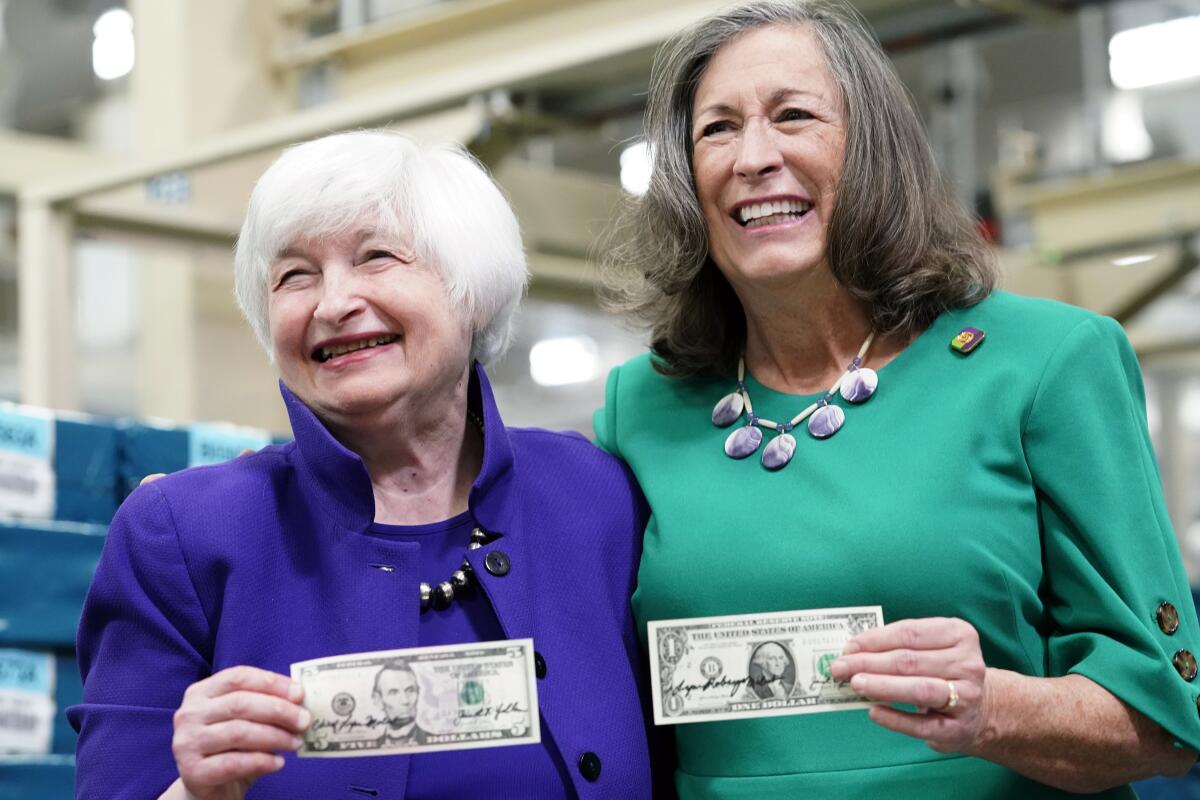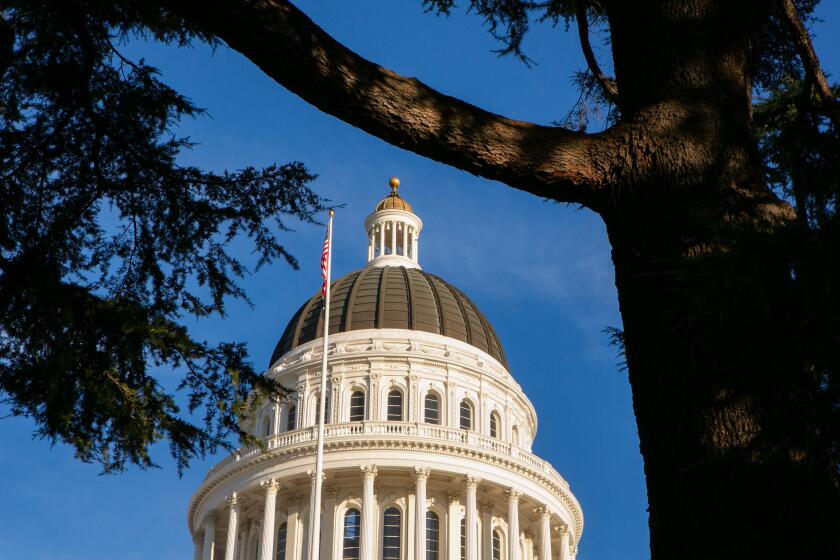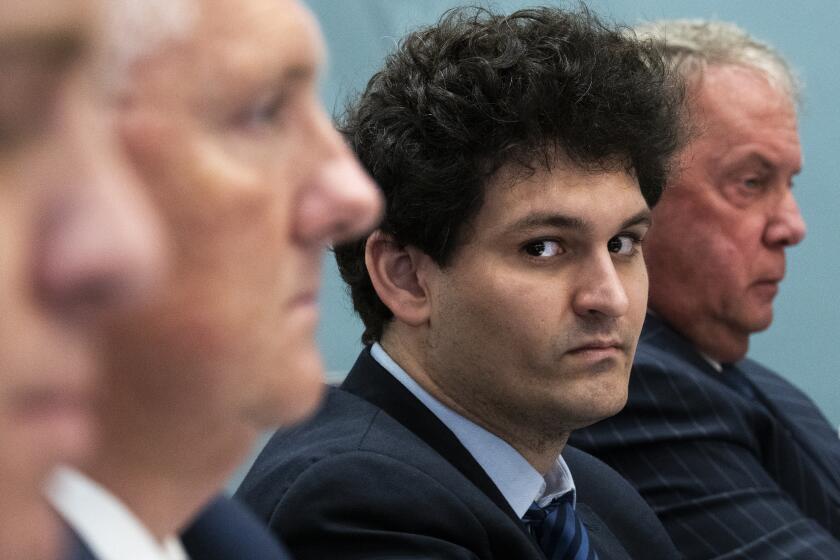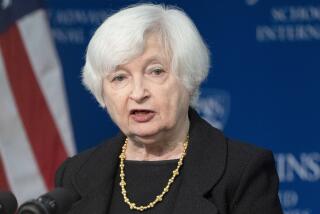Yellen, Malerba become 1st female pair to sign U.S. currency

- Share via
Treasury Secretary Janet Yellen on Thursday helped mark a milestone in U.S. history when she held up a newly minted $5 bill signed for the first time ever by two women.
Yellen’s signature will appear alongside that of U.S. Treasurer Lynn Malerba, the first Native American in that position.
Yellen joked during a stop in Texas about the bad handwriting of some of her male predecessors and said, “I will admit, I spent some quality time practicing my signature.”
“Two women on the currency for the first time is truly momentous,” added Malerba, who traveled with Yellen to a Bureau of Engraving and Printing facility in Fort Worth to provide their signatures.
They ceremonially signed fresh sheets of bills in $1 and $5 denominations and posed with samples to mark the history-making moment. The new notes will go into circulation next year.
Anusha Chari, an economist who chairs the American Economic Assn’s. Committee on the Status of Women in the Economics Profession, calls Yellen’s signature on U.S. currency “a huge milestone, but it also shows us how far we have to go.”
The Treasury Department was created in 1789, and until Yellen only white men had led it.
More than a dozen individuals who worked with David Graziano described him as a volatile and bullying boss.
Yellen made her reputation as a stoic chair of the Federal Reserve and a shrewd forecaster, and now is at the forefront of far-flung efforts to use economic levers to help stop Russia’s war in Ukraine, employ tax policy to protect the planet from climate change and oversee a massive effort to strengthen the beleaguered Internal Revenue Service.
That puts her at the center of domestic and global politics, inviting new levels of pressure and second-guessing by friends and foes. She is tackling this challenge as the United States is suffering from inflation that hit a 40-year high this summer and sowed fears of a coming recession.
Even as Yellen watched the fresh bills carrying her signature roll out at the Bureau of Engraving and Printing’s currency facility, her remarks focused on Biden administration policy accomplishments rather than her status as the first woman to serve as Treasury secretary.
On the Ukraine conflict instigated last February by Russian President Vladimir Putin, she said, “Together with over 30 countries, we have denied Russia revenue and resources it needs to fight its war.”
As for the domestic economy, she said, pandemic relief and a new law to boost production of semiconductors have positioned the U.S. “to capitalize on a wave of economic opportunities for the American people, including in communities often overlooked.”
Later, talking to reporters, Yellen said she thinks the U.S. can avoid a recession.
As recession winds blow and job cuts increase, employers report that they may first look at employees who work from home.
“Obviously, there are risks that the economy faces, but I think we’re not in a wage-price spiral. Supply chain bottlenecks are clearly beginning to ease. That’s helpful,” she said. “I believe we’re on the right track in terms of lowering inflation, and a recession is not inevitable.”
Now, two years into President Biden’s first term, Yellen has put to rest rumors that she might be ready to leave the administration early and is strapping in for more economic — as well as political — battles ahead.
Along with managing the Treasury’s role in the Ukraine war, she faces the herculean task of revitalizing an IRS that is getting an $80-billion funding boost, and enforcing an anti-money laundering effort that requires documenting the beneficial owners of tens of millions of U.S. businesses in hopes of crushing corruption around the world.
She occupies an increasingly politicized role in which Congress and foreign governments matter as much as the financial markets.
Her Treasury Department is implementing an oil price cap aimed at hobbling the Russian economy as House Republican leader Kevin McCarthy of California is questioning the level of U.S. support for Ukraine. The Treasury is also implementing tens of billions of dollars in tax incentives to address climate change, which has rankled some European allies and proved controversial with Republicans.
And the wage gains in the most recent U.S. jobs report suggest the economy might have to endure more pain than expected to bring inflation back to the Fed’s target of 2% annually.
The state has sent out 10.5 million inflation relief payments since October, according to the California Franchise Tax Board.
Along the way, Yellen has not shied away from controversy or speaking her mind on issues that many Americans look at solely through a cultural lens.
When Sen. Tim Scott (R-S.C.) at a May congressional hearing told Yellen that she was “harsh” for speaking about the positive economic effects of abortion access for women, she replied, “This is not harsh, this is the truth.” She also has challenged the view that havens for hidden cash lie outside the U.S., instead arguing that the U.S. has become the “best place” to hide illicitly obtained money.
Yellen generated some tension with the White House this year when she veered somewhat from Biden’s insistence that his $1.9-trillion coronavirus aid package did not contribute to inflation.
Republican lawmakers have drawn on analyses by major economists such as Harvard University’s Larry Summers to say that the sum was excessive and sparked inflation. Breakages in the global supply chain and a jump in food and energy costs after Russia invaded Ukraine also have contributed to the rise of prices to uncomfortable levels, putting the economy at heightened risk of a recession.
Yellen acknowledged on CNN in May that she had been “wrong then about the path that inflation would take.” Biden said he had been apprised of the possible risks of inflation when putting together the relief package, but he told the Associated Press in an interview that “the idea that it caused inflation is bizarre.”
This would-be crypto trillionaire promised to give away his wealth, but did he ever really mean it?
Yellen’s predictions at the Treasury about financial markets on other points have proved accurate.
Her warnings about the risks of a deregulated cryptocurrency market foresaw the recent chaos. Crypto markets have seen at least two major crashes, dozens of scams, Ponzi schemes and hundreds of billions of dollars made and evaporated overnight.
Yellen has also used her platform as a top government official to warn that despite women’s advancements in the workplace, a glass ceiling prevents many from reaching the very top positions.
Yellen, the only person ever to lead the Treasury Department, the Federal Reserve and White House Council of Economic Advisors, still gets flak from members of both political parties for not being more dynamic and politically savvy at times and for being too direct at other times.
Summers, Treasury secretary under President Clinton, said in a statement to the Associated Press that Yellen “continues a remarkable career in economic policy at the U.S. Treasury Department. No other Treasury Secretary has had a deeper commitment to social justice as a central goal of macro and financial policies.”
The praise comes as Summers has leveled criticism at the Biden administration for the size of its coronavirus relief, saying its excesses flooded the economy with money and pushed up prices. He has argued that the Fed must continue to raise rates to reduce inflation, an action that could push the U.S. and other nations into a recession.
More to Read
Inside the business of entertainment
The Wide Shot brings you news, analysis and insights on everything from streaming wars to production — and what it all means for the future.
You may occasionally receive promotional content from the Los Angeles Times.














